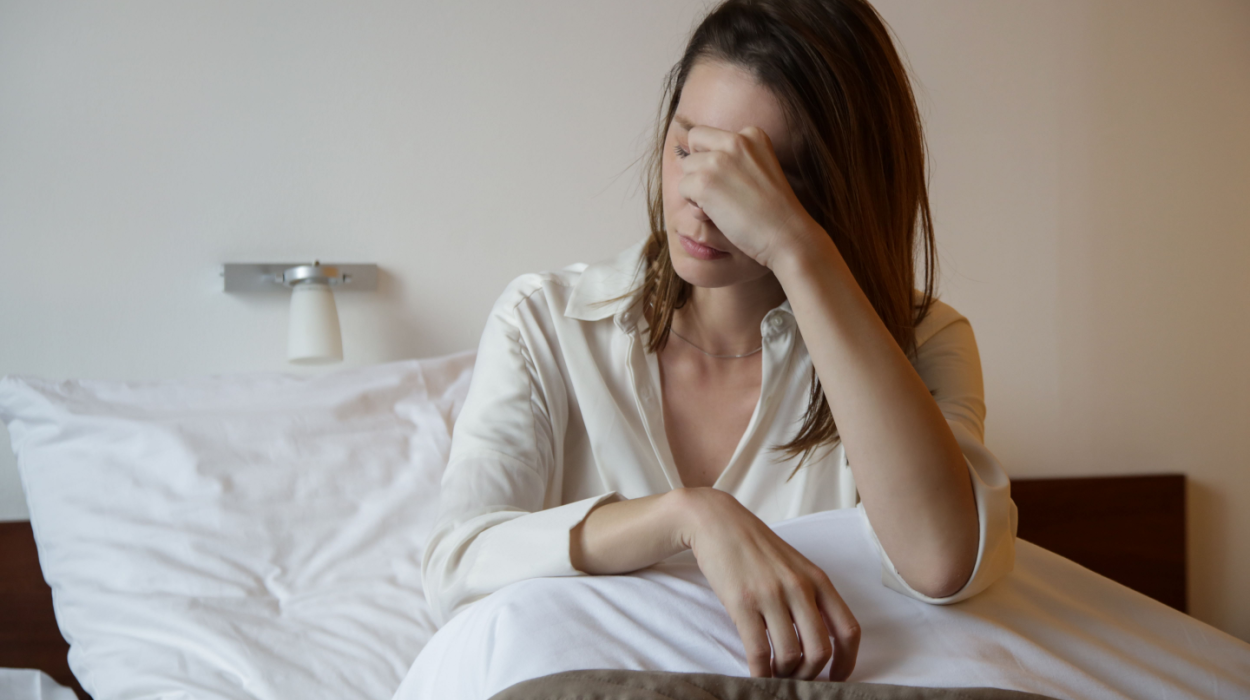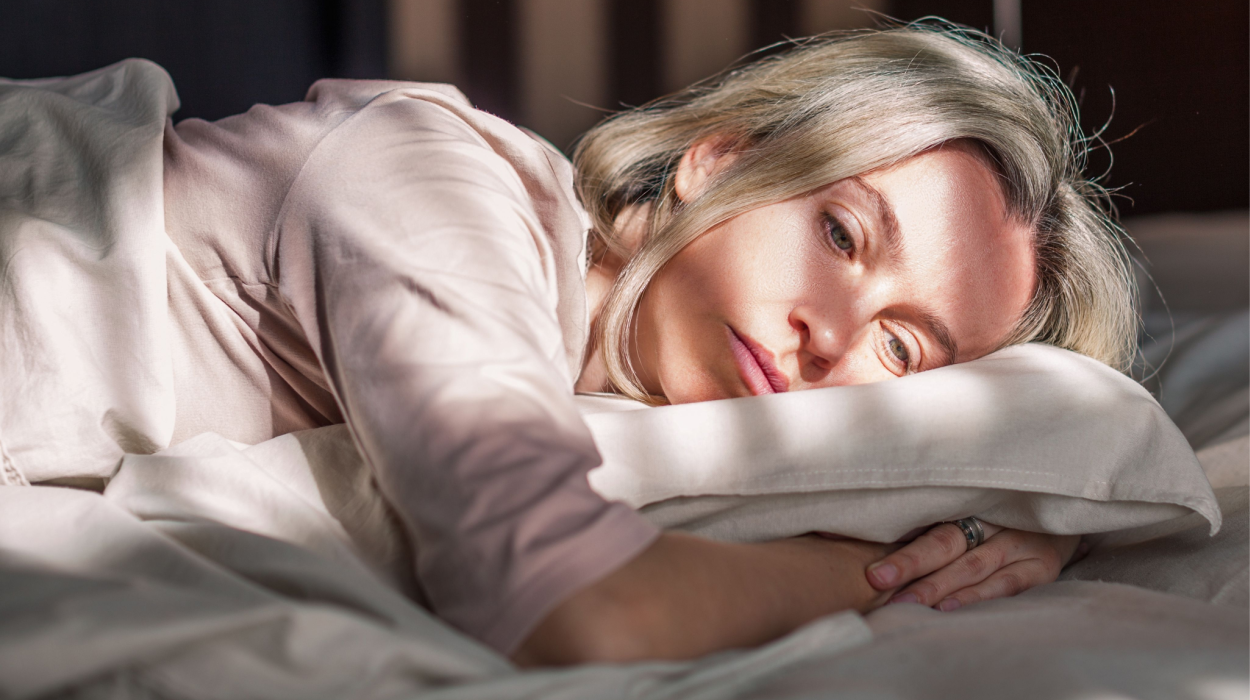 Expert's opinion
Expert's opinion
Expert's opinion
The article is a subjective view on this topic written by writers specializing in medical writing.
It may reflect on a personal journey surrounding struggles with an illness or medical condition, involve product comparisons, diet considerations, or other health-related opinions.
Although the view is entirely that of the writer, it is based on academic experiences and scientific research they have conducted; it is fact-checked by a team of degreed medical experts, and validated by sources attached to the article.
The numbers in parenthesis (1,2,3) will take you to clickable links to related scientific papers.
Anxiety And Perimenopause: Signs & Solutions 2024

Perimenopause brings with it a whole host of physical, mental, and emotional changes. One of those changes can be an increase in anxiety,[1] usually an unwelcome development for women already juggling a full life. What causes menopausal anxiety, and how can you treat it? Read on to find out more about this common but difficult affliction and what you can do about it.
Can Perimenopause Cause Anxiety?
Yes. Perimenopause may be a direct cause of anxiety if you are stressed about this major life transition. Or it may be an indirect cause, increasing anxiety by interfering with sleep or causing other distressing physical symptoms. If you experience anxiety during perimenopause, you are far from alone.
Can Perimenopause Cause Anxiety?
One reason why anxiety may be worse in the morning is due to your body’s natural circadian rhythms, in which you excrete different hormones at different times of day. The body naturally releases more cortisol,[5] a stress hormone, in the mornings. If you’re prone to anxiety due to mental or physical factors, that cortisol may prompt you to feel more anxious than usual in the morning.
Anxiety And Perimenopause

Many people experience increased anxiety during life transitions, and one of the most anticipated life transitions in a woman’s journey is perimenopause.[2] If you’re feeling anxious and noticed that your symptoms coincided with the beginning of the menopausal transition, you’re not alone. Menopause is one of several risk factors for increased anxiety at midlife.
Why Does Anxiety Happen During Perimenopause?
It is unclear exactly what causes anxiety to spike during menopause, but there are some plausible theories. One is that the hormonal fluctuations of menopause can cause anxiety and other mental health symptoms, such as mood swings, in people who are especially vulnerable to the impacts of hormone changes on the brain. For these people, changes in the levels of estrogen[6] and progesterone, which are normal in perimenopause, can also be a source of anxiety and distress.
Other possible sources of anxiety are the physical menopause symptoms that many women experience . You may experience hot flashes, a sudden and intense onset of sweating, increased heart rate, and feeling of being overheated. These sensations are similar to anxiety symptoms, and thus can prompt an anxiety attack. Because hot flashes can occur suddenly, the anticipation of experiencing a hot flash at an inconvenient location or time may also increase a woman’s general anxiety and make it difficult to do the things she might like to do. Finally, hot flashes can cause sleep disturbances, which can also predispose a person to increased anxiety as well as other mental health difficulties.
There is another, deeper psychological reason why some women experience anxiety in menopause: many societies strongly value youthful beauty, which often determines a woman’s relevance. Some women may experience menopause as a symbolic transition in which, according to society, their youth and beauty are fading. They may even notice being treated differently when in public as a result of their changing status. This transition can understandably provoke anxiety.
Perimenopausal Anxiety Treatment
There are several medical treatments available[3] for those struggling with perimenopausal anxiety. The treatment your health care provider recommends will depend on your personal medical history and the severity of your symptoms. Hormone replacement therapy, one treatment option for perimenopausal anxiety, typically involves taking hormones either orally or transdermally.
These hormones mimic your pre-menopausal hormone balance and can restore pre-menopausal mood. Not everyone is a good candidate for HRT, though: it’s important to disclose to your provider your entire medical history prior to taking these medications, since they can be risky when taken by the wrong person.
Another common treatment for perimenopausal anxiety is taking an SSRI. These medications are known primarily for treating depressive symptoms, but they can also be very effective in the treatment of anxiety.[4]
SSRIs may have other effects, though, such as low libido, so talk to your provider in depth before opting for this treatment. Be sure to mention any other supplements you may be taking, and always make sure they are as high in quality as possible.
Tips To Reduce Anxiety During Perimenopause

Exercise
Menopause involves both physical symptoms and mental ones, and that can feel overwhelming. But the beauty of exercise is that it is medicinal to both the body and the mind. Incorporating exercise into your routine can help to regulate your heart rate and blood pressure, and may increase resiliency to both physical and emotional stressors. This can alleviate your anxiety and equip you with the tools you need to navigate it when it hits.
Healthy Eating
A nourishing diet based on whole foods can provide just the grounding you need during menopause. It’s important to know what to cut out, and that may mean avoiding caffeine and alcohol, both of which can worsen anxiety. You may also want to look at reducing your sugar intake.
You may notice your body composition changing as you enter menopause, since the body stores fat differently when hormones change. Many women find themselves trying new diets or exercise routines around this time in response to these changes. But remember that blood sugar fluctuations, inadequate nutrition, and over-restriction can worsen anxiety as well. If you’re having trouble with your mood and want to focus on your diet, work with a registered dietitian or similar professional who can help you change your diet in a healthy way.
Sleep
Sleep disturbances are common in perimenopause, and in turn poor sleep can wreak havoc on your mental health. If you find it hard to sleep as a result of hot flashes, there are things you can do. Make sure that you sleep in a cool bedroom, including using fans if you have to; sleep in light clothing and/or layers that you can easily remove if you become overheated; and try keeping ice water by the bed, to help you recover quickly from hot flashes that keep you up.
In addition to these strategies, make sure that you practice good sleep hygiene in other ways. That includes reducing the amount of artificial light you are exposed to before bed, doing calming rather than stimulating activities prior to bed, and going to sleep and waking up around the same time each day. Although these changes can be hard to make at first, start small and over time you’ll notice an improvement in your sleep quality, energy, and mental health.
Mind-Body Therapies
Some of the most important tools in your toolbox for beating anxiety fall under the umbrella of mind-body therapies. These are approaches that can help you bring calm, nonjudgmental awareness to your body and surroundings, and thus modulate your stress response.[7]
Breathing exercises are one form of mind-body therapy that allows you to focus on your breath for its calming and grounding properties. Mindfulness is another tool that can improve your mental health and reset your nervous system when practiced on a regular basis.
How Long Does Perimenopause Anxiety Last?
The duration of the menopausal transition varies from person to person, so it can be hard to predict how long perimenopausal anxiety will last. On average, the late menopausal transition is approximately one to three years, and early menopause lasts somewhere from two to six years. Perimenopause is the time surrounding your final menstrual period, while menopause itself refers to the final menstrual period and the time following it. Overall, that’s up to nine years of menopausal transition – although many people experience a shorter duration of symptoms.
It’s important to see your doctor or midwife if you’re having menopausal symptoms of any kind that interfere with your daily life. Early recognition and treatment of anxiety can lead to better outcomes and improved quality of life, so don’t hesitate to reach out.
Conclusion
Menopause brings with it a host of changes, and unfortunately anxiety is often one of them. Approaching this transition holistically can help you cope with the changes with groundedness and ease.
Frequently Asked Questions
It can vary from person to person, but some theorized reasons are changing hormone levels, menopause symptoms, and personal and social stressors common in midlife.
Yes, but they are not right for everyone, and each works in its own way. Have a thorough conversation with your provider if this is something you’d like to explore.
Yes. Sometimes it doesn’t feel like our choices make that big of an impact on our health, but they truly do. Even small steps toward taking better care of your body through your daily habits can have a big impact on your overall mental health.
Yes! You will find the right combination of lifestyle factors, social supports, and possibly medications or supplements to ease your symptoms. Don’t give up, and keep up your hope that you will make it through this period.
+ 7 sources
Health Canal avoids using tertiary references. We have strict sourcing guidelines and rely on peer-reviewed studies, academic researches from medical associations and institutions. To ensure the accuracy of articles in Health Canal, you can read more about the editorial process here
- Ljiljana Muslić and Natasa Jokic-Begic (2016). The experience of perimenopausal distress: Examining the role of anxiety and anxiety sensitivity. [online] ResearchGate. Available at: https://www.researchgate.net/publication/292342970_The_experience_of_perimenopausal_distress_Examining_the_role_of_anxiety_and_anxiety_sensitivity.
- Santoro, N. (2016). Perimenopause: From Research to Practice. Journal of Womens Health, [online] 25(4), pp.332–339. doi:https://doi.org/10.1089/jwh.2015.5556.
- Liisa Hantsoo and C. Neill Epperson (2017). Anxiety Disorders Among Women: A Female Lifespan Approach. Focus, [online] 15(2), pp.162–172. doi:https://doi.org/10.1176/appi.focus.20160042.
- Rubinow, D.R., Johnson, S., Schmidt, P.J., Girdler, S.S. and Gaynes, B.N. (2015). EFFICACY OF ESTRADIOL IN PERIMENOPAUSAL DEPRESSION: SO MUCH PROMISE AND SO FEW ANSWERS. Depression and Anxiety, [online] 32(8), pp.539–549. doi:https://doi.org/10.1002/da.22391.
- Rochester.edu. (2023). Cortisol (Blood) – Health Encyclopedia – University of Rochester Medical Center. [online] Available at: https://www.urmc.rochester.edu/encyclopedia/content.aspx?contenttypeid=167&contentid=cortisol_serum#:~:text=In%20most%20people%2C%20cortisol%20levels,too%20high%20for%20too%20long.
- Borrow, A.P. and Handa, R.J. (2017). Estrogen Receptors Modulation of Anxiety-Like Behavior. Vitamins and hormones, [online] pp.27–52. doi:https://doi.org/10.1016/bs.vh.2016.08.004.
- Xiao, C., Mou, C. and Zhou, X. (2019). [Effect of mindfulness meditation training on anxiety, depression and sleep quality in perimenopausal women]. PubMed, [online] 39(8), pp.998–1002. doi:https://doi.org/10.12122/j.issn.1673-4254.2019.08.19.



